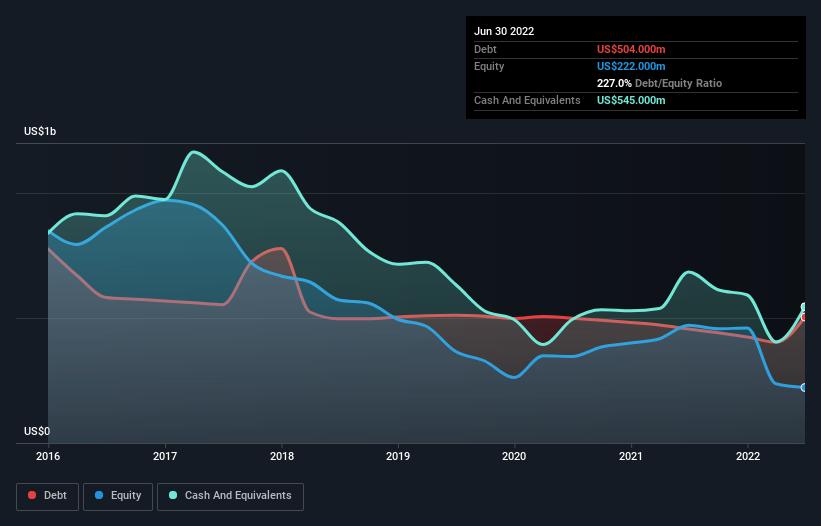
The external fund manager backed by Berkshire Hathaway's Charlie Munger, Li Lu, makes no bones about it when he says 'The biggest investment risk is not the volatility of prices, but whether you will suffer a permanent loss of capital.' So it might be obvious that you need to consider debt, when you think about how risky any given stock is, because too much debt can sink a company. Importantly, Teradata Corporation (NYSE:TDC) does carry debt. But the real question is whether this debt is making the company risky.
Why Does Debt Bring Risk?
Debt assists a business until the business has trouble paying it off, either with new capital or with free cash flow. Part and parcel of capitalism is the process of 'creative destruction' where failed businesses are mercilessly liquidated by their bankers. While that is not too common, we often do see indebted companies permanently diluting shareholders because lenders force them to raise capital at a distressed price. By replacing dilution, though, debt can be an extremely good tool for businesses that need capital to invest in growth at high rates of return. When we examine debt levels, we first consider both cash and debt levels, together.
Our analysis indicates that TDC is potentially undervalued!
How Much Debt Does Teradata Carry?
You can click the graphic below for the historical numbers, but it shows that as of June 2022 Teradata had US$504.0m of debt, an increase on US$456.0m, over one year. However, its balance sheet shows it holds US$545.0m in cash, so it actually has US$41.0m net cash.

How Strong Is Teradata's Balance Sheet?
According to the last reported balance sheet, Teradata had liabilities of US$878.0m due within 12 months, and liabilities of US$795.0m due beyond 12 months. Offsetting this, it had US$545.0m in cash and US$281.0m in receivables that were due within 12 months. So it has liabilities totalling US$847.0m more than its cash and near-term receivables, combined.
While this might seem like a lot, it is not so bad since Teradata has a market capitalization of US$3.19b, and so it could probably strengthen its balance sheet by raising capital if it needed to. But it's clear that we should definitely closely examine whether it can manage its debt without dilution. While it does have liabilities worth noting, Teradata also has more cash than debt, so we're pretty confident it can manage its debt safely.
But the bad news is that Teradata has seen its EBIT plunge 17% in the last twelve months. If that rate of decline in earnings continues, the company could find itself in a tight spot. When analysing debt levels, the balance sheet is the obvious place to start. But ultimately the future profitability of the business will decide if Teradata can strengthen its balance sheet over time. So if you want to see what the professionals think, you might find this free report on analyst profit forecasts to be interesting.
Finally, while the tax-man may adore accounting profits, lenders only accept cold hard cash. While Teradata has net cash on its balance sheet, it's still worth taking a look at its ability to convert earnings before interest and tax (EBIT) to free cash flow, to help us understand how quickly it is building (or eroding) that cash balance. Over the last three years, Teradata actually produced more free cash flow than EBIT. That sort of strong cash generation warms our hearts like a puppy in a bumblebee suit.
Summing Up
Although Teradata's balance sheet isn't particularly strong, due to the total liabilities, it is clearly positive to see that it has net cash of US$41.0m. The cherry on top was that in converted 229% of that EBIT to free cash flow, bringing in US$360m. So we don't have any problem with Teradata's use of debt. Of course, we wouldn't say no to the extra confidence that we'd gain if we knew that Teradata insiders have been buying shares: if you're on the same wavelength, you can find out if insiders are buying by clicking this link.
Of course, if you're the type of investor who prefers buying stocks without the burden of debt, then don't hesitate to discover our exclusive list of net cash growth stocks, today.
Valuation is complex, but we're here to simplify it.
Discover if Teradata might be undervalued or overvalued with our detailed analysis, featuring fair value estimates, potential risks, dividends, insider trades, and its financial condition.
Access Free AnalysisHave feedback on this article? Concerned about the content? Get in touch with us directly. Alternatively, email editorial-team (at) simplywallst.com.
This article by Simply Wall St is general in nature. We provide commentary based on historical data and analyst forecasts only using an unbiased methodology and our articles are not intended to be financial advice. It does not constitute a recommendation to buy or sell any stock, and does not take account of your objectives, or your financial situation. We aim to bring you long-term focused analysis driven by fundamental data. Note that our analysis may not factor in the latest price-sensitive company announcements or qualitative material. Simply Wall St has no position in any stocks mentioned.
About NYSE:TDC
Teradata
Provides a connected hybrid cloud analytics and data platform in the United States and internationally.
Undervalued with proven track record.
Similar Companies
Market Insights
Community Narratives



